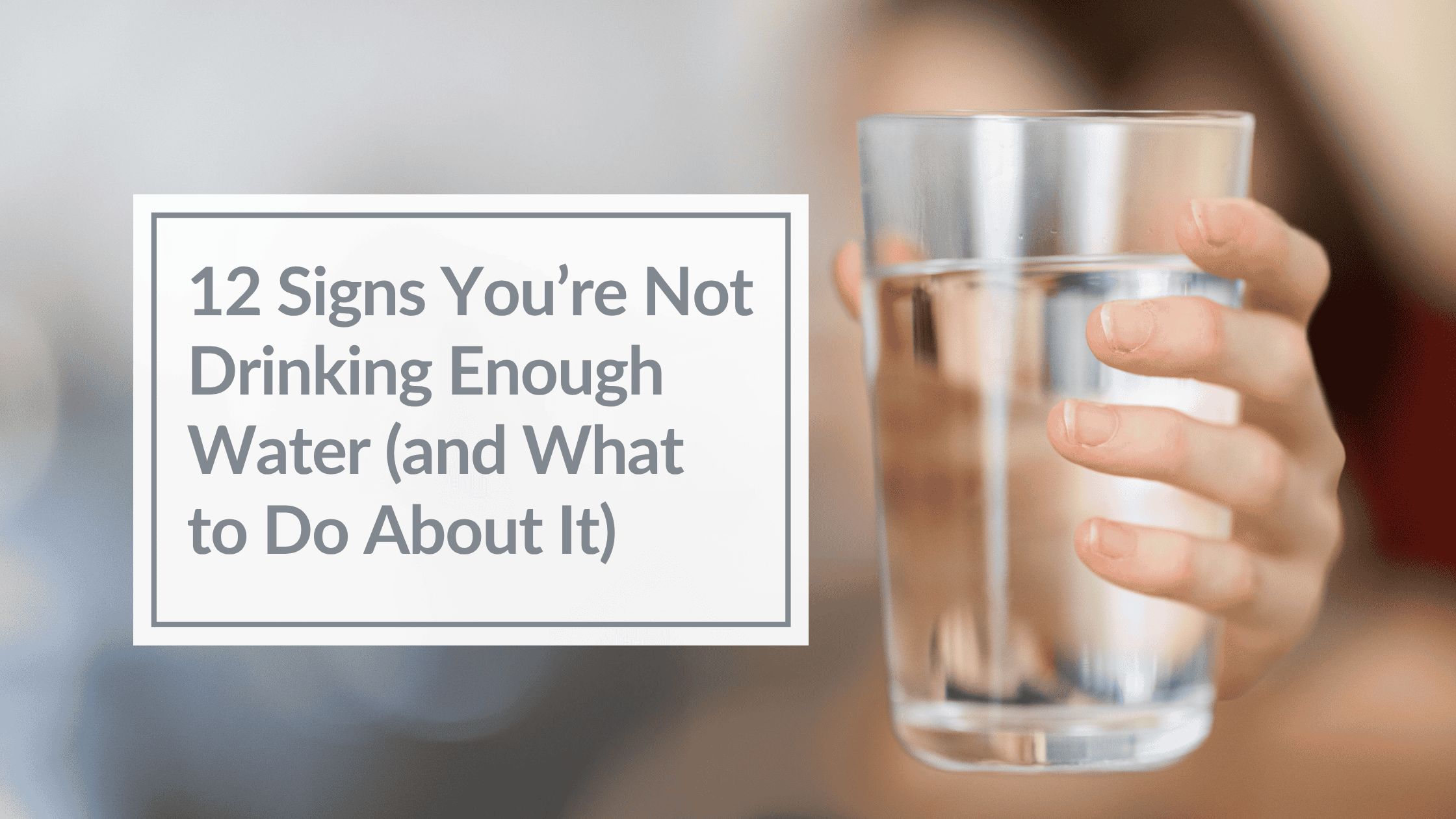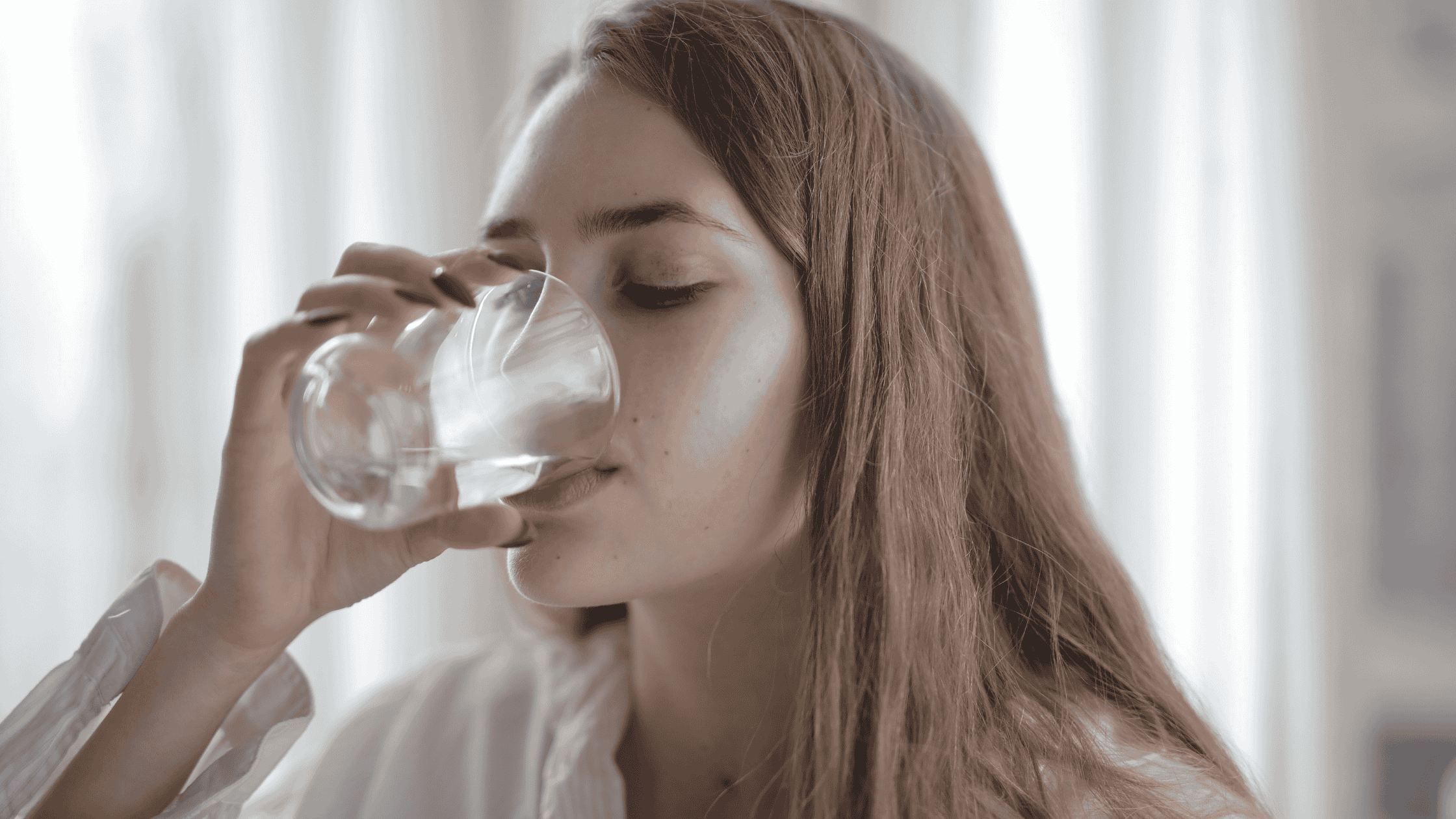
Not drinking enough water does more than leave you parched—
It can ripple through your entire body in ways you might not expect. Water powers everything from energy production to tissue repair, yet staying hydrated isn’t always as simple as pouring another glass.
Factors such as minerals, adrenal health, the quality of your water, and your body’s ability to manage fluids all influence this complex process. Without those pieces in place, you could be sipping all day and still feel like your tank is running on empty.
Chronic dehydration symptoms don’t always present as an obvious red flag, but there are definite clues! In this blog, we’ll cover 12 signs you may not be getting enough water and share smart, simple ways to stay hydrated for real, lasting energy and whole-body balance.
How Much Water Is Enough?
Water makes up about 60% of your body, and even a slight dip in that percentage can throw things off. Losing as little as 1–2% of total body water is enough to impact memory, mood, and energy, long before you ever feel thirsty.
General guidelines suggest:
Women: ~ 2.7 liters (91 ounces) of total water per day from beverages and food
Men: ~3.7 liters (125 ounces) per day from beverages and food
(Source: U.S. National Academies of Sciences, Engineering, and Medicine)
Children: A simple way to estimate how much water your child needs is the 4-2-1 rule:
- 4 ml/kg/hour for the first 10 kg of body weight
- +2 ml/kg/hour for the next 10 kg (10–20 kg)
- +1 ml/kg/hour for each kg over 20
For example:
- A 5 kg baby needs about 20 ml/hour (480 ml/day)
- A 25 kg child needs about 65 ml/hour (1,560 ml/day)
However, these numbers don’t account for individual factors such as heat, exercise, stress, or caffeine intake—all of which can significantly increase your water needs.
Here’s how chronic dehydration symptoms may show up in your daily life—and what they mean for your overall health.
12 Signs You’re Not Drinking Enough Water
1. Dry Skin, Dull Hair, and Chapped Lips
The skin is your largest organ, and it’s often one of the first places to see the effects of not drinking enough water. When hydration drops, elasticity fades, leaving your skin flaky, cracked, or prematurely lined. Hair may lose its shine and strength, while nails become brittle and prone to splitting.
On top of that, chronic exposure to indoor heating or air conditioning can cause moisture loss from your skin through transdermal water loss. Toxins like mold mycotoxins, heavy metals, and VOCs can stress the liver and lymphatic system’s reducing your body’s ability to transport nutrients and eliminate waste through the skin. Even drinking demineralized water (from reverse osmosis or distilled systems) without replenishing electrolytes can leave your cells unable to hold onto water effectively, further contributing to dryness.
2. Brain Fog, Poor Focus, and Headaches
Your brain is nearly 75% water, making it highly sensitive to fluid imbalances. Dehydration reduces blood volume and oxygen delivery to the brain. Chronic dehydration symptoms, which can manifest as headaches, dizziness, difficulty concentrating, and that heavy, foggy feeling, affects your cognition.
Chronic stress can suppress thirst cues and alter kidney function, leading to subtle fluid losses you might not notice. Plus, caffeine—often the go-to fix for a tired brain—acts as a diuretic and drains minerals critical for nerve signaling and hydration.
3. Constipation, Bloating, or Heartburn
Water keeps your Digestive System running smoothly. When you’re not drinking enough water, stools dry out and move sluggishly, leading to constipation. Dehydration can also thin protective mucosal layers in your stomach and esophagus, increasing the risk of heartburn or reflux.
Stress and toxins (like BPA and pesticides) can impair gut motility, while mineral-depleted water may limit hydration at the intestinal level. The result? Digestive discomfort that feels harder to resolve.
4. Dry Mouth and Bad Breath
Saliva production slows when you’re dehydrated, creating a sticky, dry mouth and allowing odor-causing bacteria to thrive. This isn’t just uncomfortable—it’s a sign your digestive and urogenital systems need more fluid support.

5. Sugar Cravings and Hunger
Ever feel snacky when you’re really just thirsty? The hypothalamus regulates both hunger and thirst, so dehydration can trick your brain into craving food, especially sweets or carbs, for a quick energy hit.
It’s one of those chronic dehydration symptoms that can sneak up on you, leaving you running on empty by mid-afternoon because, without enough water, blood glucose becomes more concentrated, forcing your pancreas to work harder. Combine that with caffeine or alcohol (both dehydrating), and your energy levels nosedive.
6. Frequent Urination Without Feeling Hydrated
Ironically, constantly running to the bathroom may be a sign your body isn’t holding onto water effectively. Mold exposure, heavy metal toxicity, or certain medications can stress the kidneys and adrenal glands, triggering increased urination as your body attempts to flush out toxins.
So even if you’re hitting your daily water goals, you may not be absorbing it properly. Knowing how to stay hydrated means pairing water with electrolytes and supporting your adrenal health so your body can actually use what you drink.
7. Muscle Cramps, Joint Pain, and Slow Recovery
Water lubricates joints, delivers nutrients to muscles, and helps remove metabolic waste after exercise. When dehydration sets in, you may notice stiffness, cramps, or soreness that lingers longer than usual.
Electrolyte imbalances play a big role here, too. Sodium, potassium, magnesium, and calcium create the electrical gradients that allow muscles to contract and relax. Sweat loss during exercise or sauna use without mindful replenishment can deplete these minerals and leave your locomotor system struggling to recover.
8. Dizziness, Rapid Heart Rate, or Feeling Lightheaded
Dehydration lowers blood volume, forcing your heart to beat faster to deliver oxygen and nutrients. This can show up as dizziness when standing, a racing heart, or even feelings of anxiety.
Adrenal dysfunction from chronic stress or toxin exposure may also impair your body’s ability to retain sodium, worsening fluid loss.
9. Weak Immunity and Slow Healing
Your Lymphatic System relies on proper hydration to transport immune cells and remove waste. When water is scarce, lymph flow stagnates, leaving your Immune System sluggish and less able to respond to infections.
Chronic dehydration symptoms can also impair the liver and kidneys, reducing their ability to filter out pathogens and toxins. This can create a vicious cycle where your body is more vulnerable to illness and slower to heal.
10. Hormonal Imbalances and Irregular Cycles
Water plays a crucial role in transporting hormones throughout the bloodstream and the Lymphatic System. Dehydration can disrupt the communication of the Endocrine System, leading to subtle imbalances that affect thyroid function, adrenal health, and even menstrual cycles.
It’s a powerful reminder that not drinking enough water can have ripple effects on every body system.
11. Dark Yellow or Amber-Colored Urine
Your kidneys concentrate urine to conserve water when the supply is low. Dark yellow or amber tones, especially with a strong odor, are a classic sign of dehydration.
However, remember that mold exposure, caffeine overuse, or high-stress lifestyles can exacerbate urination and mineral loss, further intensifying this cycle. Ideally, urine should be a pale yellow color, indicating proper hydration and electrolyte balance.
12. Feeling Overheated or Sweating Less
Water helps regulate body temperature through sweat. Without it, your cooling system falters, leaving you flushed, overheated, or with dry skin even in warm conditions.
Dry indoor air, high activity levels, or sauna use without mindful fluid and electrolyte replenishment can all trigger this effect.

How to Stay Hydrated: Easy Ways to Keep Your Body Thriving
Here are some tips to help you stay hydrated!
1. Start Your Day with Mineral-Rich Water
Kick off the morning with a glass of filtered water and a pinch of unrefined sea salt or trace mineral drops. This helps replenish electrolytes lost overnight and supports your cells in holding onto water throughout the day.
2. Eat Your Water
Fruits and vegetables like cucumbers, oranges, celery, and watermelon are hydration heroes. The water they contain is bound in a gel-like structure that’s often easier for your cells to absorb. This approach also delivers fiber, antioxidants, and minerals—bonus hydration support.
3. Make Hydration a Habit for Kids
Children often forget to drink water until they’re already dehydrated. Offer water before snacks, use colorful bottles or fun cups, and let them help prepare “fruit-infused” waters with berries or citrus.
4. Filter and Re-mineralize Your Water
Reverse osmosis and distilled water systems strip minerals from water. If you use these, re-mineralize with trace mineral drops, a pinch of sea salt, or by rotating in herbal infusions to support absorption. Spectralyte is a homeopathic preparation suitable for children.
5. Set Hourly Hydration Reminders
If not drinking enough water has become your default, try setting alarms or using an app to remind you to sip every hour. Small, steady intake works far better than chugging large amounts at once.
6. Infuse Flavor Naturally
Tired of plain water? Add slices of lemon, lime, cucumber, or fresh herbs like mint to encourage you to drink more. For kids, let them create their own combinations and “name” their drinks to make it fun.
7. Sip on Herbal Teas
Non-caffeinated herbal teas like chamomile, hibiscus, or nettle offer hydration and can support detox pathways and lymph flow—important if environmental toxins have been stressing your system.
8. Don’t Rely on Thirst Alone
By the time you feel thirsty, you’re already mildly dehydrated. Train yourself to drink small amounts throughout the day instead of waiting for cues.
9. Investigate Environmental Stressors
If you’re doing all the right things—drinking plenty of water, eating hydrating foods, replenishing minerals—and still showing chronic dehydration symptoms, it’s worth looking at your environment. Mold exposure, mycotoxins, and indoor air pollutants (like VOCs or off-gassing from furniture) can silently stress your detox pathways and kidneys. This often leads to increased urination as your body tries to flush out toxins, leaving you dehydrated, no matter how much you drink.
At CBH Energetics, we use bioenergetic testing to uncover these hidden stressors. It can identify energetic body stress and what environmental factors might be throwing it off. We also offer a deep dive into lifestyle and detox tips in our Wellness Activator course, which is FREE with any scan!

